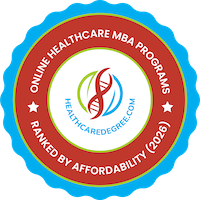

MBA with Healthcare Administration Concentration
Eastern University’s MBA with a Healthcare Administration concentration explores the complexities of the healthcare industry including health delivery systems, economics, government policy, and technology and prepares students with the unique knowledge and skills required for a career in this growing field. The concentration is optional for students enrolled in the College of Business and Leadership’s MBA in Organizational Management.
Concentration Details
- Location: Online
- Delivery: Self-paced within 7-week online courses
- Length: This concentration requires 4 classes (12 credits) in addition to the MBA Core Curriculum.
- Cost:
- Total cost of tuition & program fees for the General MBA (30 credits) is $9,900 for 2025-2026.
- Adding this concentration to the general MBA brings the student’s total program to 42 credits, and the total program cost to $13,860 for 2025-2026 (see Tuition & Fees for credit hour breakdowns).
- Note: The total numbers above do not include the cost of course materials such as textbooks.
- However, students with undergraduate business degrees who qualify for MBA Advanced Standing can apply this concentration to their elective requirements and will graduate with a total of 30 credits for $9,900.
Affordability & Excellence
 Eastern's program was ranked among the Top 10 Most Affordable Online Healthcare MBA Programs!
Eastern's program was ranked among the Top 10 Most Affordable Online Healthcare MBA Programs!
Our accredited MBA is known for excellence, flexibility, and student satisfaction.
Concentration Curriculum
This concentration consists of the 4 classes below (12 credits) in addition to the MBA Core Curriculum.
| Course Number | Course Name | Credit |
|---|---|---|
| HMGT 526 | Healthcare Finance and Economics | 3 |
| HMGT 536 | Health Information Management Systems | 3 |
| HMGT 596 | Healthcare Delivery Systems and Public Health | 3 |
| HMGT 696 | Healthcare Quality, Law, Regulatory Compliance, and Policy | 3 |
Course Descriptions
A critical review of the areas of finance and economics as they affect the U.S. Healthcare Industry. This course expands on core finance and economics MBA courses by focusing on the unique applications healthcare professionals need to successfully contribute to their organizations. These include revenue streams, third party payers, planning, pricing, performance measurement, supply, demand, elasticity, public policy, and consumer behavior. Additionally, students consider the ethical and legal ramifications of finance, economics and healthcare. Students are strongly recommended to successfully complete BUSA 585 and BUSA 615 prior to HMGT 526.
A comprehensive review of the information technologies, electronic medical records, informatics, and techniques used to gather, analyze, and use patient information in the delivery of healthcare services. Students learn the importance of data integrity and its uses in a healthcare organization. Additionally, students evaluate infrastructure, software systems, and technological trends so they can be prepared for future changes in information management services and how these changes will affect patient care.
An analysis of the continuum of care and public health and how health delivery systems are structured, managed, and financed. Gains knowledge of the value chain by evaluating the roles of providers, patients, and payers through the lens of various delivery systems such as general hospitals, specialists, long-term care, in-home care, etc.
A survey of the operational nuances of healthcare administration brought about by the web of regulatory bodies, health care standards, and legal responsibilities. Students leave this course able to evaluate and improve knowledge of healthcare law, quality of care through process improvement, and risk management through the use of risk assessment tools and protocols; and navigate through the complex space of regulations, policy, and certifications.
About the MBA
View a full overview of Eastern's MBA, including core classes, tuition, and distinctives.

